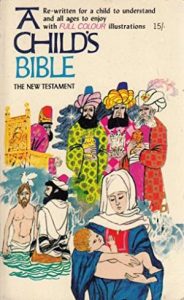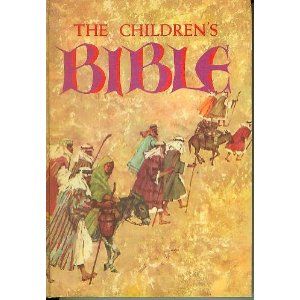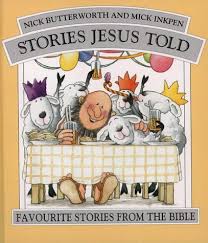“Tell me the stories of Jesus
I love to hear
Things I would ask him to tell me
If he were here
Scenes by the wayside
Tales of the sea
Stories of Jesus
Tell them to me”
 I grew up with Bible stories. I had a children’s bible with great, illustrations. It came in two volumes in a slipcase, and I managed to find an image online. I remember the bigger one we had in class at primary school and I found that as well. When I was older we all got given Living Bibles presented at church and were encouraged to use Scripture Union Quest and Keynotes daily reading notes for children, then Young People’s Every Day With Jesus. Sunday school, youth fellowship, church, we were taught from the Bible. We all had Bibles emblazoned with stickers on the front, on the title pages and in other spaces, mainly stickers earned by learning verses by heart. Verses were underlined, bookmarks
I grew up with Bible stories. I had a children’s bible with great, illustrations. It came in two volumes in a slipcase, and I managed to find an image online. I remember the bigger one we had in class at primary school and I found that as well. When I was older we all got given Living Bibles presented at church and were encouraged to use Scripture Union Quest and Keynotes daily reading notes for children, then Young People’s Every Day With Jesus. Sunday school, youth fellowship, church, we were taught from the Bible. We all had Bibles emblazoned with stickers on the front, on the title pages and in other spaces, mainly stickers earned by learning verses by heart. Verses were underlined, bookmarks  and bits of paper with notes, or hymnsheets, or conference timetables or other things were shoved in all over the place. The mantra was that Bibles which were falling apart were read by people who weren’t. Only we were teenagers so of course, we all were. I can remember being taught to refer everything back to the Bible, to read it daily, to always ask ‘Where does the Bible say…?’ about what we were being taught.
and bits of paper with notes, or hymnsheets, or conference timetables or other things were shoved in all over the place. The mantra was that Bibles which were falling apart were read by people who weren’t. Only we were teenagers so of course, we all were. I can remember being taught to refer everything back to the Bible, to read it daily, to always ask ‘Where does the Bible say…?’ about what we were being taught. 
When I went to uni to study Religious studies the students were a good mix of those from a Christian background, those with other faith backgrounds and those with no faith background. Christianity predominated though, and I remember many complaining that we had to treat the Bible like a literature text and tear it to pieces. Although we were taught to apply a methodological atheism, one of the most valuable lessons I learned was from my Christian Origins tutor in my first year, Chip Coakley, who on going through an essay with me told me that I should never feel I had to agree with a tutor, or say what I thought they wanted to hear but that I was free to present my own conclusions as long as I backed them up with sound academic argument. I got a 2:2 for the essay, and told that if my conclusion had matched my argument throughout it would have been a 2:1. Oddly enough I’d now argue that particular essay (on the authorship of the Pastoral Epistles) the opposite way.
Later, when my first child was born, the first book I bought for her was the Bible, the first story I read was the nativity. Later still when helping to plan a curriculum for the youngest Sunday School groups, the first thing we wanted was to give them a grounding in knowing and loving Bible stories, both old and new testament. As a family, we read Bible stories, I can remember reading through Psalms at bedtime with my children, we discussed Bible themes in the same way we discussed historical matters, political matters, literature, ecology, at first educating our children and then as they grew encouraging them to develop their own thoughts, to ask questions, to think through the implications of what they read and believe. 
At the root of all that has been the Bible. The Bible as foundational to our faith, but also to the way we want to live. I believe a Christian is someone who follows Jesus, and the best source I have to find out more about Jesus is the Bible. Yes, there are gaps, there are inconsistencies (yes, really), there are big questions – but if I truly and honestly want to follow Jesus, if I really believe he is worth following, then the gospels are my primary source material.
All this is to say that I love the Bible. It’s words bring me life, bring me comfort, bring me challenges, bring me correction, bring me Jesus. This is the starting point I come from. I believe the Bible is inspired by God and used by the Holy Spirit to draw us to God.
But I also have huge problems with the Bible.
What exactly is the Bible?
Is the Bible infallible? Inerrant?
We call it the ‘Word of God’, but what does that mean, and is it a claim the Bible itself makes?
The Bible contains sea monsters, unicorns, an earth and the centre of the universe with the sun orbiting it,
The Bible has lots of internal contradictions.
The Bible has internal inconsistencies.
 The Bible was written in different languages, by many people, over a large time period, influenced by a lot of different cultures, it takes many different literary forms, and all this needs taking into consideration when reading it.
The Bible was written in different languages, by many people, over a large time period, influenced by a lot of different cultures, it takes many different literary forms, and all this needs taking into consideration when reading it.
The Bible could, if we wished, be claimed to be infallible or inerrant on matters pertaining to salvation and righteousness, but evangelical Protestantism goes much further and claims that the Bible is incapable of error or mistake on ANY matter, including history, geography, geology, physics, astronomy etc, etc. They also claim that this was the teaching of Jesus, Paul, the early church, and throughout history. It wasn’t.
Inspired means breathed, and some translations use ‘God-breathed’ rather than inspired in 2Tim3:16, but all that does is lend emphasis to an evangelical interpretation. Inspired doesn’t normally mean ‘every word dictated by’ and that is how the Bible is normally treated.
Seeking to understand the Bible, taking it anything other than face value – especially on controversial matters is normally written off by evangelicals as taking a low view of the Bible, as seeking to twist scripture, to cherry-pick, to ignore God’s plain word…and yes, I’ve heard and read every single one of those. However taking the Bible seriously enough to read about even minor characters, taking it seriously enough to look at all possible interpretations, taking it seriously enough to research original words and their meaning to those who wrote them, taking it seriously enough to discover about the culture of the different times and how that interacts with the Bible, taking it seriously enough to look beyond a single favoured translation, taking it seriously enough to spend time seeking how to follow Jesus and understand scripture – that is not a low view of scripture.
 I think we need to look beyond flinging accusations at those we disagree with. We need to understand where each other is coming from. We need to accept that there are different interpretations of the Bible and seek to find common ground – and that is hard to do when we all believe that the other’s interpretation can be damaging to people, and when some people believe that the wrong interpretation could put a person’s salvation at risk. I don’t have answers, I’m only a back row troublemaker, a questioner, a follower of Jesus – but I am convinced more and more that the way forward has to be a greater understanding of just how much God loves us, how much he loves everyone, and how much we need to love.
I think we need to look beyond flinging accusations at those we disagree with. We need to understand where each other is coming from. We need to accept that there are different interpretations of the Bible and seek to find common ground – and that is hard to do when we all believe that the other’s interpretation can be damaging to people, and when some people believe that the wrong interpretation could put a person’s salvation at risk. I don’t have answers, I’m only a back row troublemaker, a questioner, a follower of Jesus – but I am convinced more and more that the way forward has to be a greater understanding of just how much God loves us, how much he loves everyone, and how much we need to love.
I love the Bible, but I have a lot of questions about it.
I love the Bible, but I don’t believe it is without error.
I love the Bible, but I think we need to think about what it actually is.
Note: I am aware that I have mentioned inconsistencies, errors, and contradictions without listing them. Pointing out individual instances wasn’t the point of this post. The point was to say where I come from when talking about the Bible and to open the idea of needing to ask questions about it.


One Reply to “What Does The Bible Say?”